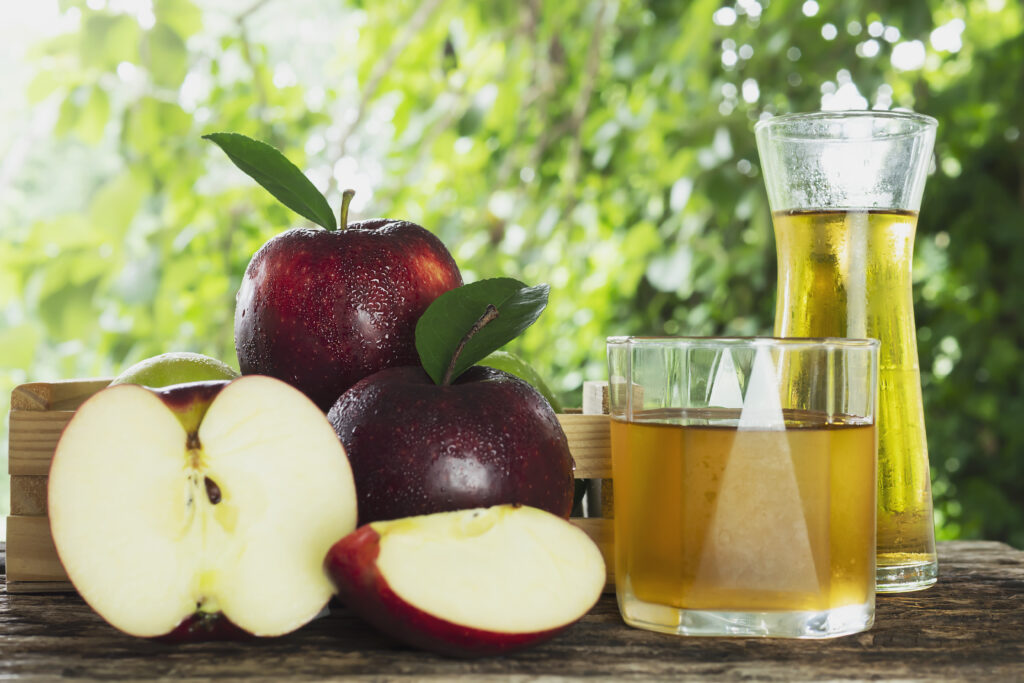Apple Cider Vinegar (ACV) is a natural remedy that has gained significant popularity in the health and nutrition world. From aiding digestion to improving skin health, this fermented liquid is believed to offer many health benefits. But what exactly is apple cider vinegar, and how can it be used safely?
In this article, we’ll explore what apple cider vinegar is, the top 10 benefits, its potential side effects, proper dosage, and how to incorporate it into your daily routine.
What is Apple Cider Vinegar?
Apple cider vinegar is made from fermented apple juice. The process involves two steps:
-
Fermentation of apples with yeast to convert sugar into alcohol.
-
Addition of bacteria (usually Acetobacter) to turn the alcohol into acetic acid.
The final product is a tangy, sour liquid containing acetic acid, water, enzymes, and trace vitamins and minerals. The cloudy substance found in unfiltered ACV is known as “the mother,” consisting of beneficial bacteria, enzymes, and proteins.
Unfiltered, raw, and organic ACV with “the mother” is often considered the most beneficial for health purposes.
Top 10 Benefits of Apple Cider Vinegar
1. Aids Digestion
Apple cider vinegar improves digestion by increasing stomach acid levels, which helps break down food more effectively. It may also reduce bloating and gas.
2. Supports Weight Loss
Several studies suggest that acetic acid in ACV may help suppress appetite, boost metabolism, and reduce belly fat. Drinking diluted ACV before meals may make you feel fuller, leading to fewer calories consumed.
3. Regulates Blood Sugar Levels
ACV can significantly improve insulin sensitivity and reduce blood sugar spikes after meals. It may be especially helpful for people with type 2 diabetes or insulin resistance.
4. Improves Heart Health
ACV may lower triglyceride levels, cholesterol, and blood pressure, all of which are risk factors for heart disease. The antioxidant properties in ACV may also support vascular health.
5. Boosts Skin Health
Thanks to its antimicrobial properties, ACV may help treat acne and improve skin texture. It’s often used as a natural toner to balance the skin’s pH and reduce breakouts.
6. Fights Harmful Bacteria
The acetic acid in ACV has antibacterial and antifungal properties, which may help kill pathogens, including E. coli and Candida.
7. Detoxifies the Body
Though the liver and kidneys naturally detoxify the body, ACV is thought to support these organs and flush out toxins, especially when used as part of a balanced diet.
8. Improves Hair Health
ACV can balance scalp pH, reduce dandruff, and add shine to hair. When used as a rinse, it acts as a natural conditioner.
9. May Improve PCOS Symptoms
Some studies suggest ACV may improve insulin function in women with polycystic ovary syndrome (PCOS), helping regulate menstrual cycles and hormone levels.
10. Soothes Sore Throat
Its antibacterial properties make ACV a traditional remedy for sore throats. Gargling a diluted mixture may help relieve pain and kill harmful bacteria.
Health Benefits at a Glance
| Benefit | How it Helps |
|---|---|
| Digestion | Enhances stomach acid, reduces bloating |
| Weight Loss | Suppresses appetite, burns fat |
| Blood Sugar Control | Increases insulin sensitivity |
| Skin Health | Reduces acne, balances pH |
| Heart Health | Lowers blood pressure & cholesterol |
| Antimicrobial | Fights bacteria & infections |
| Detoxification | Supports liver and kidney function |
| Hair Care | Reduces dandruff, adds shine |
| Hormonal Balance (PCOS) | Supports insulin and menstrual cycles |
| Sore Throat Relief | Acts as a natural disinfectant |
Potential Side Effects of Apple Cider Vinegar
Although ACV is natural, excessive or improper use can lead to side effects:
1. Tooth Enamel Erosion
The acidity of ACV can erode tooth enamel over time, leading to increased sensitivity or decay. Always rinse your mouth after drinking it.
2. Digestive Discomfort
While small amounts aid digestion, larger doses may cause nausea or upset stomach, especially if taken on an empty stomach.
3. Low Potassium Levels
Long-term or high doses of ACV might reduce potassium levels in the blood, leading to muscle cramps and weakness.
4. Throat Burns
Undiluted ACV can irritate or burn the throat. It should always be diluted in water before consumption or gargling.
5. Drug Interactions
ACV may interfere with medications like diuretics, insulin, or heart drugs. Consult your doctor before using it regularly
Recommended Dosage of Apple Cider Vinegar
Moderation is key. Most health experts suggest:
-
Daily Dose: 1 to 2 tablespoons (15–30 ml) diluted in a large glass of water.
-
Best Time to Take: 20–30 minutes before meals to aid digestion and control appetite.
-
For Skin: Dilute ACV 1:1 with water and apply as a toner or acne treatment.
-
For Hair: Mix 2–4 tablespoons with water and rinse after shampooing.
-
For Sore Throat: Mix 1 tbsp ACV with warm water and a bit of honey. Gargle (do not swallow).
Never drink it straight — always dilute it!
How to Use Apple Cider Vinegar Safely
Here are a few ways to incorporate ACV into your lifestyle:
-
Morning Detox Drink: Mix 1 tbsp of ACV, 1 tsp honey, and a dash of cinnamon in warm water.
-
Salad Dressing: Blend ACV with olive oil, garlic, and herbs.
-
Facial Toner: Mix equal parts ACV and water; apply with a cotton pad.
-
Hair Rinse: After shampooing, rinse hair with a diluted ACV solution.
Final Thoughts
Apple cider vinegar is a versatile, affordable, and natural remedy with numerous health benefits — from weight loss to blood sugar regulation and improved skin health. However, like all remedies, it should be used with care and balance.
If you have pre-existing health conditions or take medications, always speak to your healthcare provider before starting regular use.
Frequently Asked Questions (FAQs)
Q1: Can I take apple cider vinegar every day?
Yes, but limit intake to 1–2 tablespoons diluted in water daily. Overuse can lead to side effects.
Q2: What is the best time to drink apple cider vinegar?
The best time is before meals, ideally 20–30 minutes before eating to help digestion and reduce appetite.
Q3: Is apple cider vinegar safe for diabetics?
Yes, in moderate doses, it may help regulate blood sugar. But always consult a doctor before use.
Q4: Can I apply apple cider vinegar directly to my face?
No. Always dilute it with water before applying to avoid irritation or burns.
Q5: Is apple cider vinegar good for weight loss?
Yes, studies suggest that it may help with appetite suppression and fat metabolism when combined with a healthy diet.
Read more https://worldck.com/low-fat-recipes/

